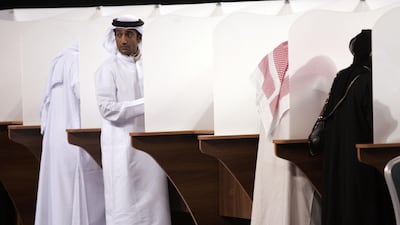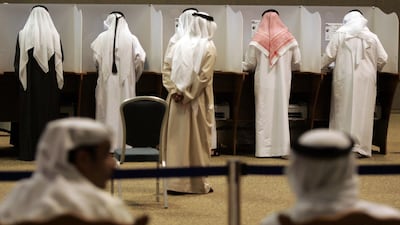The UAE was celebrating its 34th National Day when President Sheikh Khalifa announced the country’s first elections.
It was 2005 and the aim was to increase political participation among Emiratis through a “political empowerment programme”.
The Federal National Council, an advisory council, would be the perfect platform by which to hear the concerns of the country’s citizens.
"So from that we understood that there will be elections," said Salam Abu Shehib, a veteran reporter and head of Arabic-language newspaper Al Khaleej's Abu Dhabi bureau.
“There was a lot of excitement; it was the first time for the nation to experience elections.”
Soon after, in early 2006, a ministry was formed to handle FNC affairs and oversee the elections.
“After that, they announced that elections will be held in October. We started preparing coverage seven months in advance,” said Mr Abu Shehib, 55.
“Both people and officials were excited and we did a lot of interviews ahead of the elections with officials and asked people what they thought.”
Candidates employed traditional techniques to reach voters.
“They held gatherings at their majlis, in tents outside their homes and booked halls in hotels to gather the people and the press.
“Similar to what is being done now, except that now candidates are also focusing on social media a lot.
“A significant difference this time is that many more women have signed up candidates after the 50 per cent announcement, in previous elections a single woman would barely win,” said Mr Abu Shehib, referring to Sheikh Khalifa’s order that women occupy half the FNC seats this year.
Voting methods have also evolved since 2006.
During the first election, an Emirati listed on the Electoral College could vote for up to four candidates. And the process was half electronic, half manual.
“The voter cast their ballot on a computer; the vote was printed and then placed in a box,” Mr Abu Shehib said.
Voting for Emiratis in the UAE is now electronic and completed in three swift steps.
“The first Electoral College was small; a total of 6,595, but the excitement was big because it was the first federal election.”
Local press allocated a lot of space in their pages for the landmark moment in the UAE’s history.
“We arrived at the voting centre at 7.30am, at the time they held voting in Abu Dhabi at Al Jazira club’s basketball court, because the number was quite small.”
That night, the newspapers extended their print deadlines until the winners were announced.
“Everything was in print back then; we did not have online versions,” said Mr Abu Shehib.
The winners were splashed across the front pages the next morning. Among the faces was Khaled Abu Shehab, who won a seat for Ajman with 68 votes.

He said he was honoured to be part of the first elected representatives.
“The number of people who could run was small but people were excited and rushed to be part it,” said the 51-year-old army colonel.
“I checked the Electoral College List and found my name on it so I thought why not go ahead and try to be part of the experience.
“It was a new process and not everybody was clear on the procedures like they are now, especially with social media now in then loop.”
He relied mainly on close friends to run his campaign.
“I made three big posters and relied on a team of close friends to gather people and spread my message through word of mouth.”
That group of friends were the first to celebrate his victory.
“After the results were announced and I saw my name on the screen, I went home to the majlis and they were all waiting for me there.”



![Ahmed Shabib Al Dhaheri, Mohammed Fadel Al Hameli, Amal Al Qubaisi and Rashed Musabah Al Marar appear on stage after being elected to the FNC in 2006. "This is an honour I will carry all my life. It is proof that the Emirati people are [politically] aware," said Ms Qubaisi. AFP](https://www.thenationalnews.com/resizer/v2/3N6LF55LXK2MMRTJZGGWVCNAVQ.jpg?smart=true&auth=de580cba91d84ad4099634c31f2fcdff2b6a58b3c22c68f09ce5ca4ddd1452f3&width=400&height=225)


